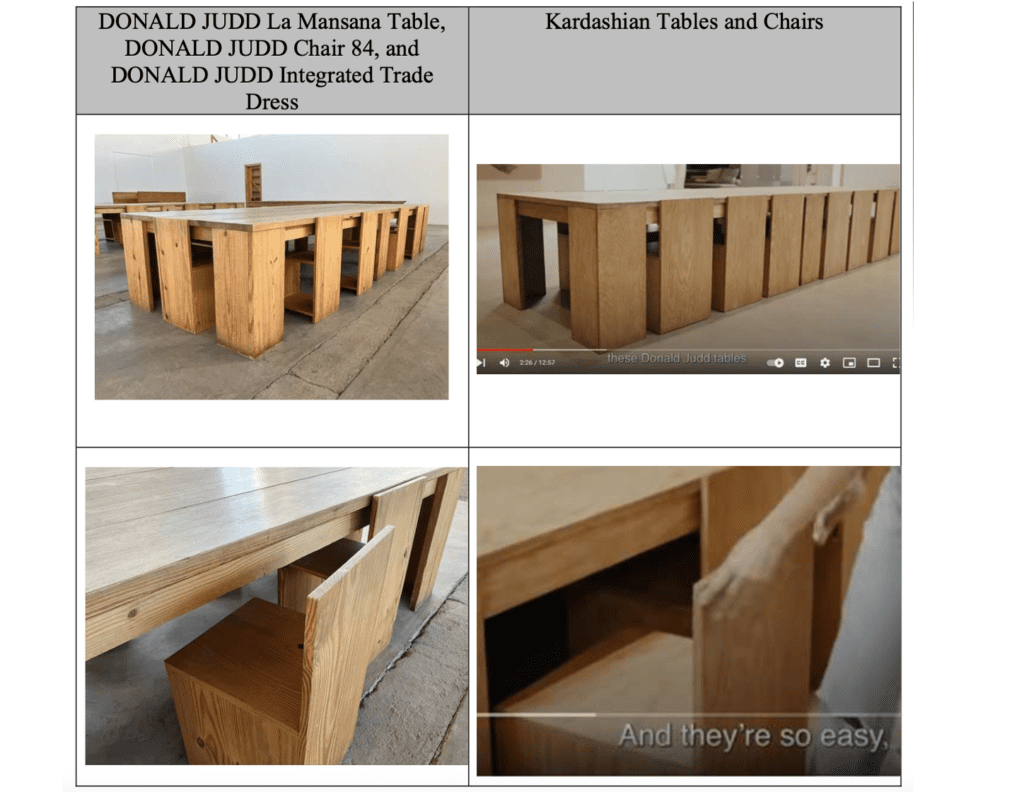Kim Kardashian is among the parties named in a trademark and copyright infringement, false advertising, and unfair competition lawsuit filed by the Judd Foundation this week. In the complaint that it lodged in a California federal court on Wednesday, the non-profit foundation for the late artist Donald Judd sets out a handful of largely trademark-centric claims, which it alleges arise out of Clements Design’s advertising and sale of knockoff DONALD JUDD furniture and Kim Kardashian’s public display and promotion of that fake furniture – via a virtual tour of her SKKN BY KIM office – as being authentic DONALD JUDD furniture “even when she knew that it was not genuine.”
Setting the stage in the March 27 complaint, the Judd Foundation – which is responsible for selling and selecting authorized retailers to sell Donald Judd works, and maintaining relevant rights, including the Judd’s trademarks and trade dress, as well as its copyrights – claims that “in blatant disregard of [those] rights, Clements Design manufactured and sold knockoff versions of the DONALD JUDD La Mansana table and the DONALD JUDD Chair 84 to Kardashian.” The Judd Foundation claims that Kardashian has since featured the “fake” furniture in a promo video for her SKKN BY KIM brand, telling viewers that she had purchased “authentic” Donald Judd designs.
“Consumers who watched the video or read the [corresponding] media coverage were misled to believe that Kardashian’s tables and chairs were authentic DONALD JUDD pieces,” the Judd Foundation asserts, noting that as a result of the video, which was viewed by some 3.6 million people online, “consumers are likely to believe Judd Foundation and the DONALD JUDD brand are connected or affiliated with, or otherwise sponsored or endorsed Ms. Kardashian and her SKKN BY KIM products.”

Kardashian knew that the furniture at issue is not authentic Donald Judd furniture and instead, amount to “unauthorized knockoffs” that were produced by Clements Design and that “slavishly imitate the [Donald Judd] trade dress,” according to the Foundation, as it was presented to her, including in an invoice from Clements Design, as pieces created “in the Style of Donald Judd.”
The Foundation asserts that the actions of Clements Design, “an interior design firm that caters to art collectors, design enthusiasts, and celebrities,” and Kardashian “harm [its] reputation by undermining its ability to control the quality of pieces sold under its trademarks, as well as its ability to control Mr. Judd’s name and identity.” (Note: The trademark rights at play here include the DONALD JUDD word mark and the trade dress of the La Mansana Table and Chair 84.) Additionally, the Foundation says that it maintains copyright protections in (and registrations for) photographs of the DONALD JUDD furniture that were used by Clements Design.
While it has attempted to amicably resolve the issues at play with Kardashian and Clements Design, prompting the latter to “deny the Judd Foundation’s rights in the furniture designs” (presumably taking issue with its alleged rights on functionality and secondary meaning grounds) and “refus[e] to cease the manufacture and sale of furniture trading off Judd Foundation’s trade dress and trademarks,” the Foundation says that such efforts have been unsuccessful and that it had no other choice but to file suit.
False Endorsement?
Putting the aside the claims that the Foundation has waged against Clements Design for trademark infringement and false designation of origin over its alleged copying of the (alleged) Donald Judd furniture trade dress; trademark infringement over its use of the DONALD JUDD word mark; the corresponding false advertising and unfair competitions claims; and the copyright infringement claim over Clements Design’s use of Donald Judd photos, the single claim waged against Kardashian is intriguing.
As a result of Kardashian’s creation and publication of the video featuring the “fake” Donald Judd furniture, the Foundation accuses the reality star-turned-entrepreneur of false endorsement. Specifically, the Foundation asserts that Kardashian “erroneously and without authorization used the DONALD JUDD [word] mark … when describing the [knockoff] chairs and tables,” a move that was “never endorsed” by the Judd Foundation. Delving in here, the Foundation states that the effect of Kardshian’s “statement and the surrounding context has misled – and is likely to mislead – consumers into believing that the furniture is authentic DONALD JUDD furniture and that Kardashian also worked personally with Mr. Judd, or his estate, in outfitting her SKKN BY KIM office.”
However, her statement is “literally false and particularly misleading,” the plaintiff argues, as the “Judd Foundation categorically prohibits customers from using purchased DONALD JUDD furniture for marketing and promotional purposes.” Therefore, viewers of the video “would believe that Judd Foundation had endorsed Kardashian and granted her unique permission to use DONALD JUDD furniture in the video.”
Part of what is particularly interesting here is the Foundation’s focus on Kardashian’s motive for name-checking the copycat furniture and presenting it as the real thing, and the resulting damages. The Donald Judd name drop by Kardashian is, according to the Foundation, an attempt by the star to align herself and her brand with Donald Judd “for the benefit of the SKKN BY KIM brand.” It argues as much in claiming that Kardashian “deliberately named Mr. Judd … and utilized the DONALD JUDD trademark to give the impression that she and her SKKN BY KIM brand were connected, affiliated, associated with, or otherwise endorsed by Mr. Judd and the DONALD JUDD brand.”
The Foundation continues on to assert that Kardashian’s “intentional” but erroneous statements about the nature of the “knockoff” furniture give “the false impression that, by providing this furniture, Judd Foundation lent the DONALD JUDD trademark and Mr. Judd’s world-renowned artistic reputation to Kardashian and the SKKN BY KIM brand,” which is not the case.
> Would consumers really believe (erroneously) that there is a Judd foundation endorsement at play here? It is worth pondering whether the average consumer would get the impression that the presence of the tables and chairs at issue (authentic or not) and Kardashian’s mention of Donald Judd by name means that he or the foundation was involved in the curation/design of the SKKN BY KIM office.
With all of the foregoing in mind, the Foundation is seeking monetary damages, as well as injunctive relief, including an order that Kardashian retract the video and correct her false statements about the furniture to the press, among other things.
The Bottom Line: As for the basis of the case, counsel for the Foundation (Megan Bannigan and David Bernstein of Debevoise) told the New York Times that the Foundation “respect[s] what [Kardashian] does,” but do not “want to be mixed up with [her]” or “to be involved with this.” In other words, the case appears to be an effort to ensure that the Judd brand is not aligned (or maybe better yet, misaligned) with others. As for how the Foundation and the Donald Judd brand are being damaged by being promoted by one of the most famous figures in the world, that remains a bit unclear.
The case is Judd Foundation v. Clements Design Inc., et al., 2:24-cv-02496 (C.D. Cal.).











